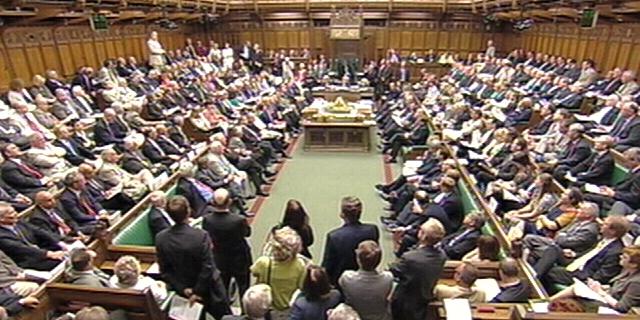There are 649 MPs , yet only room for 427 MPs to sit in the House of Commons Chamber. On television we often see them standing during popular sessions, like the Budget and PMQs. It’s not an ideal working arrangement, and I wonder what can be done to accommodate all our honourable ladies and gentlemen.
Could any changes could be made to the present historic chamber which would enable all MPs to be present – and seated – or is a new modern Chamber needed? Is it best to leave it unchanged because it is not used by all MPs on enough occasions to justify a major overhaul of some description?
Will they have to continue the tradition of pitching for a seat by requesting to join in prayers as a guarantee of a seat for the day?
I have been following a brief Twitter discussion about this between my local Cambridge MP Julian Huppert and his former excellent Conservative parliamentary rival, Nick Hillman, who works closely with David Willetts.
Julian commented how he had arrived in the Chamber on Wednesday for PMQs and the Budget, and that it was full. He was delighted to have found a seat, adding a 🙂 at the end of his tweet. He added that some MPs are forced to stand once a week for PMQs … “and the seats are booked up for prayers …”
He also said he felt that the Chamber needed to be expanded. But how can that be done?
Nick joined in the discussion and asked Julian if he was a supporter of a modernised Chamber, what he would do with the old one, and how a new one could be paid for. All good questions, though Julian hasn’t answered them yet. What are your thoughts on this? I would certainly like to see a Chamber which could seat all MPs, but I’m not sure how this can be achieved with the present layout, and I don’t know the answer to Nick’s last two questions in our present economic climate.
Nick recalled that Churchill was responsible for the present arrangement as he had opted to retain the present size of the Chamber when it was rebuilt after being bombed during the Blitz because it is mostly not full.
Although the present Chamber is considered adversarial, Churchill had his own firm views and insisted that the shape of the old Chamber was responsible for the two-party system which is the essence of British parliamentary democracy, stating: “We shape our buildings and afterwards our buildings shape us.”
BBC Democracy describes how MPs claim their seat on major parliamentary occasions, such as the Budget, when there is always a scramble for the best seats.
Ordinary backbench members can only guarantee a seat for themselves by using a prayer card.
Behind each seat on the green benches is a small, brass frame into which MPs can place a card with their name.
This card must be put in place before prayers take place each day and the MP must be in that seat during prayers.
The seat is then reserved for that MP for the rest of the day.
Our parliament has modernised to the extent that MPs can write tweets during Commons debates, yet it cannot offer them all a seat to tweet from! What would Churchill make of that….

No, no, no. Churchill deliberately went for a small Chamber because he said it was more of a cockpit and encouraged a tense atmosphere. The whole Palace is a masterpiece, and the rebuilt Chamber after the WW2 bombing retained the style and atmosphere of the Chamber which fits with the rest of the Palace.
I get very cross when people get themselves elected to something and then want to change it all. After all, political party nominees queue up to get selected for a seat, so if a member doesn’t like the system there are plenty willing to take his/her place.
Easy cut the number of MP’s down to 427, the number of MP’s is purely arbitrary so we could then save 242 MP’s salaries etc etc plus no modifications to the chamber.
I agree with Geoff, we should look at our MP’s and maybe reduce the number down.. I do think we need to rethink what areas / populations people over.
BUT the other thing that annoys me is the number of MP’s that dont sit in the house sometimes. If you watch the parliament channel at certain times there is barely anyone in the chamber. The parliament quorum level is a bit weird according to a brief read of wiki (http://en.wikipedia.org/wiki/Quorum#United_Kingdom) and only 40 people are in theory needed, which is a shocking low level if you ask me.
Most of our laws are made in Europe now and they are the final arbiters so much that what is debated in our chambers is merely academic.
Let’s cut the number of MPs to 400 instead.
Let’s ensure that MPs are ‘all in this together’ with the rest of us. And how dare they complain about expenses at a time like this ?
How could MPs be so dislocated in their opinion from the people they purport to represent on an issue such as the intervention in Libya ?
I@m with Kev on that one.
He also said he felt that the Chamber needed to be expanded. But how can that be done?
Landfill and shift the riverside wall over the Thames?
I thought DC wants to cut the number of MPs?